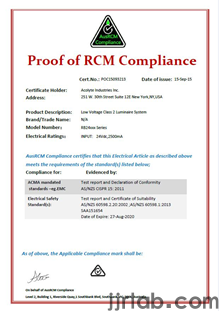
RCM Certification Electrical Safety
RCM (RegULatory Compliance mark) certification for electrical safety indicates that the supplier declares the product complies with the safety and other requirements specified by electrical safety laws/regulations in various states of Australia and New Zealand, as well as the electromagnetic compatibility requirements stipulated by the Australian Radiocommunications Act and the New Zealand Radiocommunications Act. Only products that meet the requirements of both electrical safety regulations and EMC regulations can use the rcm mark.

In Australia, electrical products are categorized into three levels of risk: Level 1 (low risk), Level 2 (medium risk), and Level 3 (high risk), with a list of 56 specific products. Level 1 and Level 2 products do not require EESS registration to use the RCM mark.
- Level 1 certification requirements: Refers to DC-poweRED products (apply for rcm certification directly with emc report) (i.e., C-TICK).
- Level 2 certification requirements: Refers to AC-powered products (apply for RCM certification with EMC report + safety report) (i.e., C-TICK + safety test report).
- Level 3 certification requirements: Refer to the list below (apply for RCM certification + EESS registration with EMC report + safety report + saa certificate).
Any electrical product with a voltage range between AC 50V to 1000V and DC 120V to 1500V must comply with Australian electrical safety laws. Products within this range are generally Level 3 products and require saa certification.
RCM certification can only be applied for by local Australian companies, which must obtain an RCM number from the Australian government. Chinese manufacturers and exporters can apply for IEC or AS/NZS reports in their own name, but these reports must be submitted by Australian importers for RCM application. The registration fee is $75 AUD per product per brand per year.
SAA certification ensures that electrical products entering the Australian market comply with local safety regulations, a common requirement in the industry. For many, determining whether their product needs SAA certification is a question. They can refer to the three categories of electrical risks in Australia to determine this. Products in the first two categories do not require SAA certification. Level 1 products do not need safety testing, and Level 2 products only need to pass Australian standard safety tests. Only Level 3 products require SAA certification.
Email:hello@jjrlab.com
Write your message here and send it to us
 EMC Item – Introduction to Radiated Emission Test
EMC Item – Introduction to Radiated Emission Test
 IEC 62471 Photobiological Safety of Lamps and Lamp
IEC 62471 Photobiological Safety of Lamps and Lamp
 New European Toy Standard EN 71-1:2026
New European Toy Standard EN 71-1:2026
 EN71 Series Standards Compliance February 13, 2026
EN71 Series Standards Compliance February 13, 2026
 European Toy Safety Standard EN 71-20:2025
European Toy Safety Standard EN 71-20:2025
 EN 18031 Certification for Connected Devices on Am
EN 18031 Certification for Connected Devices on Am
 Compliance Guide for Portable Batteries on Amazon
Compliance Guide for Portable Batteries on Amazon
 2026 EU SVHC Candidate List (253 Substances)
2026 EU SVHC Candidate List (253 Substances)
Leave us a message
24-hour online customer service at any time to respond, so that you worry!




